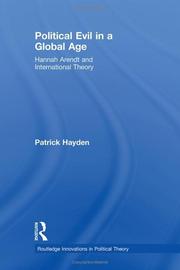| Listing 1 - 10 of 12 | << page >> |
Sort by
|
Book
ISBN: 1599964430 9781599964430 9781599961620 Year: 2009 Publisher: Amherst, Mass. HRD Press
Abstract | Keywords | Export | Availability | Bookmark
 Loading...
Loading...Choose an application
- Reference Manager
- EndNote
- RefWorks (Direct export to RefWorks)
In the last fifty years, there has been a growing interest in the power of polarities as it relates to leadership and business success. Whether referred to as paradoxes, dilemmas or polarities, research shows that leaders and organizations who manage them well outperform those who don't. In Power Surge, Margaret Seidler takes the basic principles of Polarity Management and translates them to raise self-awareness for both personal and work relationships. Polarity Management principles provide a broader view and give clarity to what makes you strong and potentially stronger. The principles apply
Industrial efficiency. --- Leadership. --- Management. --- Polarity. --- Problem solving.
Book
ISBN: 1282594265 9786612594267 9042028793 1441606459 9789042025509 9042025506 9781441606457 9789042028791 Year: 2009 Publisher: Kenilworth Rodopi
Abstract | Keywords | Export | Availability | Bookmark
 Loading...
Loading...Choose an application
- Reference Manager
- EndNote
- RefWorks (Direct export to RefWorks)
The papers collected in this volume are expanded from papers given at the 6th Global Conference on Evil and Human Wickedness, which took place in March 2005. The chapters here represent the diversity and interdisciplinary nature of the conference itself covering topics such as historical and theological concepts of evil, media representations of evil, contemporary debates surrounding the Bosnia war and woman perpetrators in Birkenau, and the construction of the Other as evil in the face of the continuing hysteria over AIDS. The range of the papers collected here makes this book essential reading for students of all humanities disciplines.
Good and evil --- Good and evil. --- Evil --- Wickedness --- Ethics --- Philosophy --- Polarity --- Religious thought
Book
ISBN: 9780521107624 Year: 2009 Publisher: Cambridge New York [etc.] Cambridge University Press
Abstract | Keywords | Export | Availability | Bookmark
 Loading...
Loading...Choose an application
- Reference Manager
- EndNote
- RefWorks (Direct export to RefWorks)
Book
ISBN: 9783161495458 Year: 2009 Publisher: Tübingen Mohr Siebeck
Abstract | Keywords | Export | Availability | Bookmark
 Loading...
Loading...Choose an application
- Reference Manager
- EndNote
- RefWorks (Direct export to RefWorks)
Good and evil --- Providence and government of God --- 276 =71 AUGUSTINUS:248 --- Evil --- Wickedness --- Ethics --- Philosophy --- Polarity --- Religious thought --- Christianity --- Latijnse patrologie-:-Spiritualiteit. Ascese. Mystiek. Vroomheid--AUGUSTINUS --- Augustine,

ISBN: 0674027086 9780674027084 9780674032378 0674024419 9780674024410 Year: 2009 Publisher: Cambridge, MA
Abstract | Keywords | Export | Availability | Bookmark
 Loading...
Loading...Choose an application
- Reference Manager
- EndNote
- RefWorks (Direct export to RefWorks)
What is good, how do we know, and how important is it? In this book, one of our most respected analytical philosophers reorients these questions around the notion of what causes human beings to flourish. Observing that we can sensibly address what is good for plants and animals no less than what is good for people, Kraut applies a general principle to the entire living world: what is good for complex organisms consists in the exercise of their natural powers.
Good and evil. --- Well-being. --- Welfare (Personal well-being) --- Wellbeing --- Quality of life --- Happiness --- Health --- Wealth --- Evil --- Wickedness --- Ethics --- Philosophy --- Polarity --- Religious thought
Book
ISBN: 3540769382 3642095607 3540769390 Year: 2009 Publisher: Berlin : Springer,
Abstract | Keywords | Export | Availability | Bookmark
 Loading...
Loading...Choose an application
- Reference Manager
- EndNote
- RefWorks (Direct export to RefWorks)
Earth's magnetic field is currently changing dramatically. Is the observed decrease of the dipole moment indicating a future polarity transition? What would be the effects of such a drastic change on system Earth? Can any positive or negative effects on our biosphere or even humans be expected? This book gives a first overview about the geomagnetic field in general and serves as an introduction into geomagnetism. As the topic of the book covers a wide range of scientific disciplines, the first chapter summarises basic principles of geomagnetism and related fields including a historic overview, instruments and measurements, paleomagnetic fields, basics of dynamo theory, etc. The contributed chapters review major results of international activities aiming at understanding the causes and effects of geomagnetic field variations in view of the questions above.
Geomagnetism. --- Geomagnetism --- Geomagnetic reversals --- Cosmic Physics --- Physics --- Physical Sciences & Mathematics --- Secular variations --- Geomagnetic reversals. --- Secular variations. --- Earth's polarity reversals --- Geomagnetic polarity reversals --- Polarity reversals, Geomagnetic --- Reversals, Geomagnetic --- Magnetic variations, Secular --- Secular variations (Geomagnetism) --- Earth sciences. --- Paleontology. --- Geophysics. --- Planetology. --- Earth Sciences. --- Geophysics/Geodesy. --- Space Sciences (including Extraterrestrial Physics, Space Exploration and Astronautics). --- Earth Sciences, general. --- Physical geography. --- Astrophysics. --- Geography. --- Paleontology . --- Planetary sciences --- Planetology --- Fossilogy --- Fossilology --- Palaeontology --- Paleontology, Zoological --- Paleozoology --- Historical geology --- Zoology --- Fossils --- Prehistoric animals in motion pictures --- Cosmography --- Earth sciences --- World history --- Astronomical physics --- Astronomy --- Cosmic physics --- Geography --- Space sciences. --- Geosciences --- Environmental sciences --- Physical sciences --- Science and space --- Space research --- Cosmology --- Science --- Geological physics --- Terrestrial physics
Book
ISBN: 9780754663270 Year: 2009 Publisher: Farnham, Surrey, England Burlington, Vt. : Ashgate Pub. Ltd.,
Abstract | Keywords | Export | Availability | Bookmark
 Loading...
Loading...Choose an application
- Reference Manager
- EndNote
- RefWorks (Direct export to RefWorks)
Art, Medieval --- Holy, The, in art. --- Polarity in art. --- Art and society --- Art médiéval --- Sacré dans l'art --- Contraires dans l'art --- Art et société --- Themes, motives. --- History --- Thèmes, motifs --- Histoire --- Art médiéval --- Sacré dans l'art --- Art et société --- Thèmes, motifs
Book
ISBN: 9782259207966 2259207960 Year: 2009 Publisher: Paris Plon
Abstract | Keywords | Export | Availability | Bookmark
 Loading...
Loading...Choose an application
- Reference Manager
- EndNote
- RefWorks (Direct export to RefWorks)
Good and evil --- Bien et mal --- Religious aspects --- Aspect religieux --- Devil --- Demonology --- Christianity --- History of doctrines --- Evil --- Wickedness --- Ethics --- Philosophy --- Polarity --- Religious thought --- Beelzebub --- Beelzebul --- Lucifer --- Satan --- Satanael --- Satanail --- Demonology, Christian --- Demons --- Evil spirits --- Spirits --- Spiritual warfare --- Christianity&delete& --- Devil - Christianity - History of doctrines
Book
ISBN: 9782296078406 2296078400 Year: 2009 Publisher: Paris Harmattan
Abstract | Keywords | Export | Availability | Bookmark
 Loading...
Loading...Choose an application
- Reference Manager
- EndNote
- RefWorks (Direct export to RefWorks)
Les seize questions disputées sur le mal de Thomas d'Aquin (1225-1274) constituent l'œuvre médiévale la plus importante sur ce thème. Ce livre reproduit le texte intégral de la question une qui aborde les aspects les plus fondamentaux du mal : qu'est-ce que le mal ? D'où vient-il ? Pourquoi le mal ? Comment le mal se produit-il ? Comment affecte-t-il quelqu'un ? Sous quelles formes se rencontre-t-il et laquelle est la pire ? Comment les différents maux se distinguent-ils ? Quelle est la part de responsabilité de l'homme dans les maux qu'il subit, et quelle est celle de Dieu ? Pourquoi Dieu n'a-t-il pas créé l'homme de telle manière qu'il ne puisse pas faire ou subir le mal ? Ces interrogations impliquent parallèlement une étude du bien : qu'est-ce que le bien et d'où vient-il ? Comment bien et mal sont-ils opposés ? Le mal peut-il avoir un caractère de bien ? Le Bien suprême qui est Dieu, est-il à l'origine du mal, et dans l'affirmative, comment et pourquoi ? Le lecteur contemporain appréciera l'exactitude et l'originalité des réponses que Thomas d'Aquin apporte à ces interrogations toujours d'actualité. Une introduction détaillée ainsi qu'un commentaire suivi l'aideront à en tirer entièrement profit.
Good and evil. --- Sin --- Bien et mal --- Péché --- Christianity. --- Christianisme --- Thomas, --- Good and evil --- Christianity --- Péché --- Evil --- Wickedness --- Ethics --- Philosophy --- Polarity --- Religious thought --- Sin - Christianity --- Thomas, - Aquinas, Saint, - 1225?-1274. - Quaestiones disputatae de malo - Commentaries --- Thomas, - Aquinas, Saint, - 1225?-1274. - Quaestiones disputatae de malo

ISBN: 9780415451062 9780203882535 9781134057887 9781134057924 9781134057931 9780415599450 Year: 2009 Publisher: New York Routledge
Abstract | Keywords | Export | Availability | Bookmark
 Loading...
Loading...Choose an application
- Reference Manager
- EndNote
- RefWorks (Direct export to RefWorks)
International relations. --- Globalization --- Good and evil. --- 811 Filosofie --- 814 Theorie van de internationale betrekkingen --- Evil --- Wickedness --- Ethics --- Philosophy --- Polarity --- Religious thought --- Evil in motion pictures --- Global cities --- Globalisation --- Internationalization --- International relations --- Anti-globalization movement --- Coexistence --- Foreign affairs --- Foreign policy --- Foreign relations --- Global governance --- Interdependence of nations --- International affairs --- Peaceful coexistence --- World order --- National security --- Sovereignty --- World politics --- Political aspects. --- Arendt, Hannah, --- Good and evil --- Political aspects --- Arendt, Hannah --- Blücher, Hannah Arendt, --- Bluecher, Hannah Arendt, --- Ārento, Hanna, --- Arendt, H. --- Arendt, Khanna, --- ארנדט, חנה --- アーレント, ハンナ,
| Listing 1 - 10 of 12 | << page >> |
Sort by
|

 Search
Search Feedback
Feedback About UniCat
About UniCat  Help
Help News
News